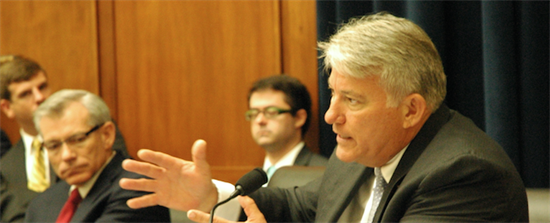Task Force Focuses on Whether U.S. Doing Enough to Stop Financing of Terror
Washington,
September 9, 2015
WASHINGTON - The Financial Services Committee’s Task Force to Investigate Terrorism Financing held its fifth hearing today and examined areas where U.S. efforts to stop terrorist financing can be improved. At today’s hearing the Task Force, which was formed earlier this year, also reviewed the level of cooperation between various federal agencies involved in countering terrorist financing and whether there should be more cooperation between government and the private sector. Task Force Chairman Mike Fitzpatrick (R-PA) said, “This Task Force has clearly sounded the alarm of the threat posed by self-financing terrorist organizations and must ensure every option is considered in the U.S. response to this danger. Today’s hearing is an important part of accomplishing the mission of this group and better protecting American lives from increasingly well-funded and financed terror syndicates.” Task Force Vice Chairman Robert Pittenger (R-NC) said, “Iran will soon receive a windfall of over $100 billion, and their 46 banks will be integrated into the world’s financial system. Preventing these dollars from funding terror must be a priority. Today we heard from experts on how America can work harder and smarter to fight terrorism financing, and I look forward to working with my colleagues in a bipartisan manner to address the challenges we heard today.” Key Takeaways:
Topline Witness Quotes: “For the past decade or so, the U.S. government has attempted to develop a professional cadre of law enforcement agents, civilian and military intelligence officers, analysts, and others to pursue a new field of operations that came to be known as ‘Counter Threat Finance’ operations. Their purpose was to effectively counter the financial and logistical depth and sustainment capacity of adversaries engaged in irregular or traditional warfare. Hitting the finances, financiers, and illicit networks, it was thought, would become an important means of warfare. Progress has been limited.” – Scott Modell, Managing Director, The Rapidan Group “Particularly in the near and medium term, as Iran receives economic benefits from the lifting of sanctions under the nuclear accord it signed in July with the P5+1, this state sponsor of terror will have more funds to apply to its terrorist proxies in the region. The U.S. Treasury Department estimates that about $50 billion of Iran’s foreign exchange reserves to be unfrozen under the accord will be immediately accessible to Iran. Iran will have to dedicate these reserves to defending its currency and to its most pressing economic needs. Nevertheless, Iran presumably will be able to send more money to its terrorist proxies in the region, even as an economic windfall under the nuclear deal may emerge slowly.” – Elizabeth Rosenberg, Senior Fellow and Director of Energy, Economics, and Security Program, Center for a New American Security “Terrorists make substantial money by controlling supply chains for delivery of their products, such as drugs, as well as by taxing the smuggling of others that pass through borders or territory that they control. The ability to tax the transit of commodities is one key to their financing. Organized crime groups’ extortion of trade has been known for a significant period, which is why they are so deeply involved in ports and the trucking industry. Yet terrorist groups on many different continents also profit from exploiting supply chains and taxing trade. This insight has not merited sufficient attention from the counter-terrorism community.” – Louise Shelley, Founder and Director of Terrorism, Transnational Crime and Corruption Center, George Mason University ### |


